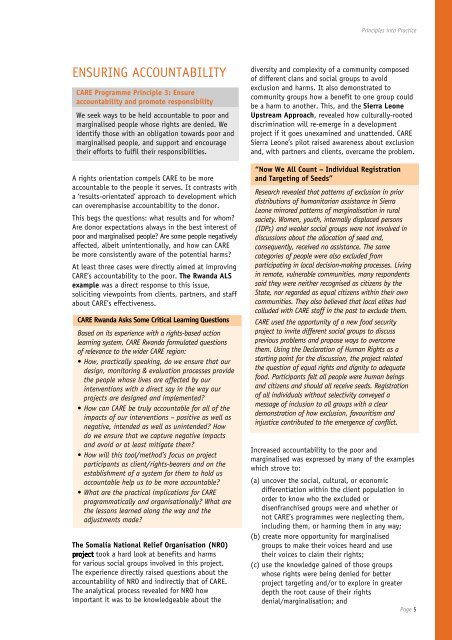Principles into Practice - Handicap International
Principles into Practice - Handicap International
Principles into Practice - Handicap International
- No tags were found...
You also want an ePaper? Increase the reach of your titles
YUMPU automatically turns print PDFs into web optimized ePapers that Google loves.
<strong>Principles</strong> <strong>into</strong> <strong>Practice</strong>ENSURING ACCOUNTABILITYCARE Programme Principle 3: Ensureaccountability and promote responsibilityWe seek ways to be held accountable to poor andmarginalised people whose rights are denied. Weidentify those with an obligation towards poor andmarginalised people, and support and encouragetheir efforts to fulfil their responsibilities.A rights orientation compels CARE to be moreaccountable to the people it serves. It contrasts witha ‘results-orientated’ approach to development whichcan overemphasise accountability to the donor.This begs the questions: what results and for whom?Are donor expectations always in the best interest ofpoor and marginalised people? Are some people negativelyaffected, albeit unintentionally, and how can CAREbe more consistently aware of the potential harms?At least three cases were directly aimed at improvingCARE’s accountability to the poor. The Rwanda ALSexample was a direct response to this issue,soliciting viewpoints from clients, partners, and staffabout CARE’s effectiveness.CARE Rwanda Asks Some Critical Learning QuestionsBased on its experience with a rights-based actionlearning system, CARE Rwanda formulated questionsof relevance to the wider CARE region:• How, practically speaking, do we ensure that ourdesign, monitoring & evaluation processes providethe people whose lives are affected by ourinterventions with a direct say in the way ourprojects are designed and implemented?• How can CARE be truly accountable for all of theimpacts of our interventions – positive as well asnegative, intended as well as unintended? Howdo we ensure that we capture negative impactsand avoid or at least mitigate them?• How will this tool/method’s focus on projectparticipants as client/rights-bearers and on theestablishment of a system for them to hold usaccountable help us to be more accountable?• What are the practical implications for CAREprogrammatically and organisationally? What arethe lessons learned along the way and theadjustments made?The Somalia National Relief Organisation (NRO)project took a hard look at benefits and harmsfor various social groups involved in this project.The experience directly raised questions about theaccountability of NRO and indirectly that of CARE.The analytical process revealed for NRO howimportant it was to be knowledgeable about thediversity and complexity of a community composedof different clans and social groups to avoidexclusion and harms. It also demonstrated tocommunity groups how a benefit to one group couldbe a harm to another. This, and the Sierra LeoneUpstream Approach, revealed how culturally-rooteddiscrimination will re-emerge in a developmentproject if it goes unexamined and unattended. CARESierra Leone’s pilot raised awareness about exclusionand, with partners and clients, overcame the problem.“Now We All Count – Individual Registrationand Targeting of Seeds”Research revealed that patterns of exclusion in priordistributions of humanitarian assistance in SierraLeone mirrored patterns of marginalisation in ruralsociety. Women, youth, internally displaced persons(IDPs) and weaker social groups were not involved indiscussions about the allocation of seed and,consequently, received no assistance. The samecategories of people were also excluded fromparticipating in local decision-making processes. Livingin remote, vulnerable communities, many respondentssaid they were neither recognised as citizens by theState, nor regarded as equal citizens within their owncommunities. They also believed that local elites hadcolluded with CARE staff in the past to exclude them.CARE used the opportunity of a new food securityproject to invite different social groups to discussprevious problems and propose ways to overcomethem. Using the Declaration of Human Rights as astarting point for the discussion, the project relatedthe question of equal rights and dignity to adequatefood. Participants felt all people were human beingsand citizens and should all receive seeds. Registrationof all individuals without selectivity conveyed amessage of inclusion to all groups with a cleardemonstration of how exclusion, favouritism andinjustice contributed to the emergence of conflict.Increased accountability to the poor andmarginalised was expressed by many of the exampleswhich strove to:(a) uncover the social, cultural, or economicdifferentiation within the client population inorder to know who the excluded ordisenfranchised groups were and whether ornot CARE’s programmes were neglecting them,including them, or harming them in any way;(b) create more opportunity for marginalisedgroups to make their voices heard and usetheir voices to claim their rights;(c) use the knowledge gained of those groupswhose rights were being denied for betterproject targeting and/or to explore in greaterdepth the root cause of their rightsdenial/marginalisation; andPage 5

















